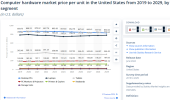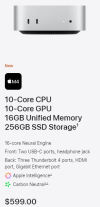phaZed
Well-Known Member
- Reaction score
- 3,206
- Location
- Richmond, VA
Doesn't look like it. The average computer per unit sales cost is between $780-860. So, with a $599 Mac Mini still not selling, something else must be going on.No, that would be cost. The majority of people buy cheap PCs. They can't afford to buy a Mac or an expensive PC.


Well, I appreciate the analogy, but I think this one fails. The reason the steering wheel and pedals stay the same is primarily because it has to work with the unchanging anatomy of a human being - that, and that the NHTSA have standards that must be adhered to(Such as which side the drivers seat is on, or which side the turn signal stock is on. A software system (OS) is not the same as physical machinery controls.That's why cars are basically all the same when it comes to where they put the steering wheel, brake pedals, etc. There are minor changes each time they redesign a vehicle, but the way you operate it remains the same (hence the word operating system).
As for XP, I'm not saying that there wouldn't be a learning curve to going to Windows 11 - but it's not very complicated once learned. Let's face it, I still have these folks from XP, too - and they can't generally "correctly" use XP after 20 years, either. The amount of times I see an XP desktop full of Icons for every program, and every PDF and file they download is stunning. No concept of organization or where things are. But still, if you look at OS usage rates, most people have already moved from XP, or 7 or Vista or 8... the majority have moved on. Edge cases will always exist and people will always have favorites - but it doesn't make something new, "unusable", or even "desired" after one becomes semi-proficient with it. I liked XP. Would I go back? Hell no.
